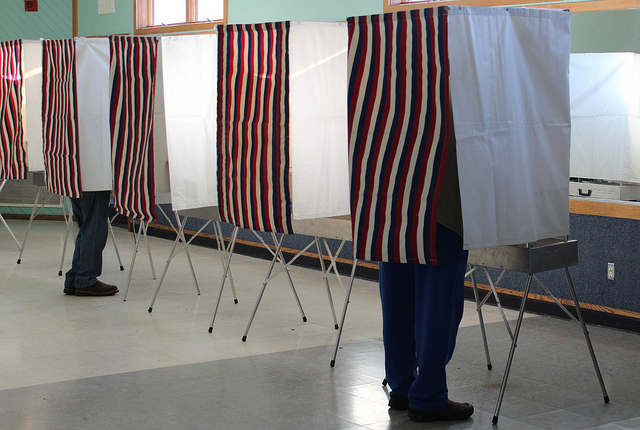
"Dude, check out who I voted for!"
We soon could be seeing a lot more selfies with that caption. That's because legislation legalizing ballot selfies in voting booths landed on California Gov. Jerry Brown's desk on Friday.
Assembly Bill 1494 amends California law that, for now, says "a voter shall not show" a ballot "to any person in such a way as to reveal its contents." The new law awaiting the governor's signature says "a voter may voluntarily disclose how he or she voted if that voluntary act does not violate any other law." The measure passed the state Senate earlier this year and the state Assembly last week on a 63-15 vote.
"I see this as a First Amendment issue," Assemblyman James Gallagher, a Republican representing Yuba City and one of the bill's sponsors, told colleagues during a floor vote. "All this does is to say that those who want to share how they voted have the right to do so."
Across the US, the law in the 50 states on voting booth selfies is mixed. No federal law addresses the issue, and there's a smattering of court challenges across the country. Consult these guides from the Huffington Post and the Digital Media Law Project on whether it's OK to snap a picture of yourself showing your votes on the November 8 presidential ballot.
The issue essentially boils down to the country's historic approach of ballot secrecy and integrity— which is now confronted with a social media society armed with mobile phones. Uploading and sharing marked ballots is as easy as pressing a button.
Snapchat says the ballot booth selfie is as American as apple pie. In a friend-of-the-court brief (PDF) in a case challenging New Hampshire's ban against them, the company says "ballot selfies and similar digital information-sharing are important ways that younger voters participate in the political process and make their voices heard." Snapchat also argues that "newsgatherers like Snapchat have a First Amendment interest in disseminating user-generated content, including ballot selfies, as part of their political coverage."
In a footnote, Snapchat even defined the selfie: "In its strictest sense, a selfie is a photo where the photographer is also a subject. But the term has also been used to describe all smartphone pictures shared online, including those here."
For its part, New Hampshire told (PDF) the 1st US Circuit Court of Appeals that the law outlawing selfies "preserves the integrity of New Hampshire elections."
"The statute secures voter’s right to vote their conscience while in the voting booth," New Hampshire wrote.
New Hampshire noted that the statute does not prohibit a "voter expressing who they voted for by any other means written, visual or oral."
New Hampshire said the 2014 law was needed to curtail vote buying and voter coercion, an argument that Snapchat declared as being "flimsy."
US District Judge Paul Barbadoro, the federal judge who presided over the case in the lower courts, agreed with Snapchat.
"Neither the legislative history of the new law nor the evidentiary record compiled by the parties provide support for the view that voters will be either induced to sell their votes or subjected to coercion if they are permitted to disclose images of their ballots to others," Barbadoro ruled. (PDF)
New Hampshire appealed. Oral arguments are scheduled (PDF) September 13 before the 1st US Circuit Court of Appeals in Boston.
The penalty for violating the New Hampshire law, which Barbadoro ruled was "unconstitutional on its face," is a $1,000 fine.
reader comments
120